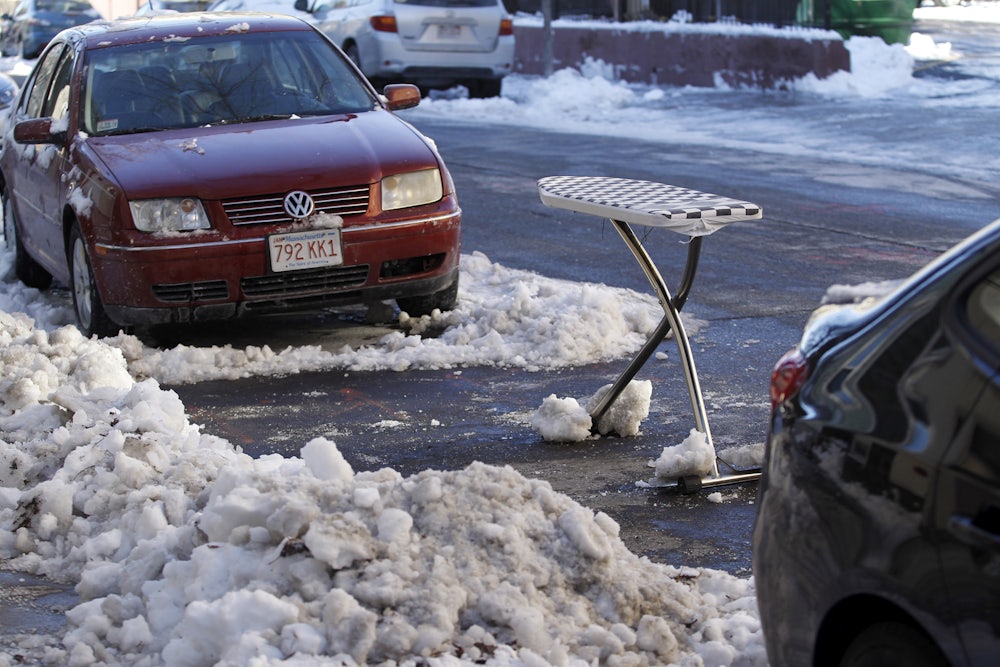Last weekend’s nor’easter dumped a full two feet of snow onto Boston, triggering a familiar debate that tore apart the city in a way other topics rarely do. In the days following the blizzard, so-called “space savers” began slowly marking their territory on the city’s public streets.
It’s a practice that those who live in warmer climes may be unfamiliar with, but in Beantown, it’s all the rage: Residents lay claim to dug-out parking spaces using an admittedly charming array of junk chronicled by Boston Magazine, including beach chairs, beaten-up end tables, mannequins, barstools and ironing boards. One Southie resident even boasted to a local newscaster that he was blocking off his spot with booby-trapped cans that would splatter paint all over anyone who tried to move them. The improvised markers are intended to signify that someone has painstakingly shoveled their car out of that spot and, according to local custom, is now temporarily reserving it to enjoy the fruits of their labor.
Reportedly stretching back several decades, the practice has organically emerged in several cities with harsh winters and public street parking. In Chicago, it’s called “dibs”; Philadelphians refer to it as “savesies.” But if the folksy objects springing up near snowy curbs are widely understood, they’re hardly universally embraced: Walk a few blocks post-snowstorm in an area that adheres to this code, and you’ll see not only space savers, but space-saving deployments scattered on their sides in a snowbank—the product of anti–space saver vigilantism. It’s long past time for a détente.
As far as I can tell, snowy space saving has driven decades of meltdowns on both sides everywhere it exists. Drivers violating the sanctity of space savers have gotten their tires slashed, had their body paint keyed, and have returned to cars pelted with raw eggs. People have gotten embroiled in physical fights, at least one of which ended in murder.
It is impossible to overstate how much people care about this: Public officials get asked about it at press conferences; three separate threads about it on my neighborhood’s Facebook page this week racked up hundreds of comments, every one of them engaging with the topic as if it’s nothing short of a capital-J Justice issue. (Full disclosure – I was one of them. And I was livid!) For defenders, respecting space savers is a matter of basic respect for your neighbors and hard work they’ve put in excavating their automobile in the bitter cold. For opponents, space savers are a unilateral seizure of public space that reduce the supply for everyone.
Why, exactly, do the stakes feel so high that emotionally stable adults are reduced to extralegal score settling or pacing in exasperation around their apartment? Because it’s about nothing less than America itself.
As any cold-climate driver knows, unburying a motor vehicle from the piled-up aftermath of a heavy snowfall is miserable: You’ll damn near freeze your fingers off, strain your back from all the bending and lifting, and work up a moderate sweat repeatedly hauling heavy shovelfuls up over the curb. Toss in whatever ice scraping is called for, and the process could easily chip off an hour or two of the only life you’ll ever get. It’s exactly this arduous work that imbues toiling shovelers with a sense of ownership they don’t feel during the summertime. As one note slapped on the windshield of an alleged space-saver disregarder in Dorchester put it last week, “YOU KNOW YOU DIDN’T SPEND HOURS YESTERDAY SHOVELING OUT THIS SPOT SO WHY THE EVER LOVING #@i$ ARE YOU PARKED IN MY SPOT?!?!”
Another Bostonian articulated the same idea to a Boston Globe reporter a decade ago: “You shovel it out, you deserve it … that’s only right.” A blogger in Chicago agreed that the “dibs” rules are about fair compensation for hard work: “When someone digs out a spot and places a chair in the empty space, it is theirs. It is somewhat of a tradition here.” Aspiring mayoral candidate Rahm Emanuel backed “dibs” in 2015, asserting that car owners earn brief ownership of cleared spots by building “sweat equity.”
There’s a reason the idea of “sweat equity” resonates so deeply with people that they fortify their parking spots by jimmy-rigging paint cans into DIY land mines. As MIT professor Susan Sibley argued in the Journal of Comparative Law, Team Space Saver is pretty much articulating the “labor theory of property” famously enshrined by John Locke in his 1689 Second Treatise of Government, which held that cultivating land made it yours.
Though the Earth, and all inferior Creatures be common to all Men, yet every Man has a Property in his own Person. This no Body has any Right to but himself. The Labour of his Body, and the Work of his Hands, we may say, are properly his. Whatsoever then he removes out of the State that Nature hath provided, and left it in, he hath mixed his Labour with, and joyned to it something that is his own, and thereby makes it his Property. It being by him removed from the common state Nature placed it in, hath by this labour something annexed to it, that excludes the common right of other Men. For this Labour being the unquestionable Property of the Labourer, no man but he can have a right to what that is once joyned to, at least where there is enough, and as good left in common for others.
It’s a sentiment that would make perfect sense angrily scrawled in permanent marker across a car window in 2022. And if aggrieved shovelers aren’t intimately familiar with the works of John Locke, they’re certainly steeped in the legacy of his ideas, which are inseparable from the very idea of American nationhood. The Locke Foundation think tank describes its namesake as “the intellectual father of our country.” The Declaration of Independence riffed off Locke’s conception of freedom and property as a framework to galvanize the Revolution; the labor theory of property propelled settlement westward throughout the continent for well over a century through things like the Homestead Act.
While Locke’s invocation of land and bodily labor referred to agriculture rather than snow shoveling, the logic of his unwitting adherents faces an obvious problem: Locke’s argument was predicated on the assumptions that the land tilling in question served communal interests by making neglected and valueless land productive and that there was infinitely more of it to go around.
When it comes to the space-saver system, none of that holds up. To practice space saving is to insist that one rightfully deserves dominion over public space as a reward for digging their own car out for their own personal use. It was hardly valueless before, as evidenced by the fact that it was already being used by the person digging their car out in order to drive it—so the act of “cultivating” it, in Lockean parlance, transformed a parking spot being used by a car into one being held empty. And there’s not an infinite supply of spaces to go around, as any exasperated person forced to drive past empty spots occupied by folding chairs while searching for scarce street parking can attest.
But if the space-saver enthusiasts are full of baloney, they’ve got nothing on John Locke himself, who was wrong about things with far higher stakes than winter parking. His arguments, of course, served as a pretext for the violent expropriation of American Indian land and the unyielding commodification of it that followed. The idea that there was infinitely more land for the taking drove over a century of encroachment across the Western frontier, as more and more people were incentivized to go West and “get theirs.” As many historians have argued, the frontier—and the Lockean conception of property that went with it—was a big reason that social democracy never arose in the United States the way it did in Europe: The frontier acted as a sort of escape valve for class conflict, enticing the down-and-out, who may have otherwise fought for redistribution, with the promise of property.
In short, John Locke’s ideas are part of the reason there’s limited class consciousness in this country, and why our culture emphasizes individualism over communalism. And while we’re at it, perhaps it’s even why we’re so damn dependent on cars instead of public transit, pitting neighbor against neighbor in never-ending battles over snowy parking.










